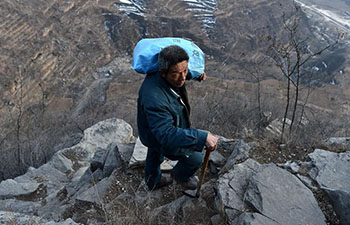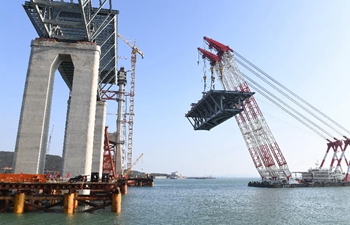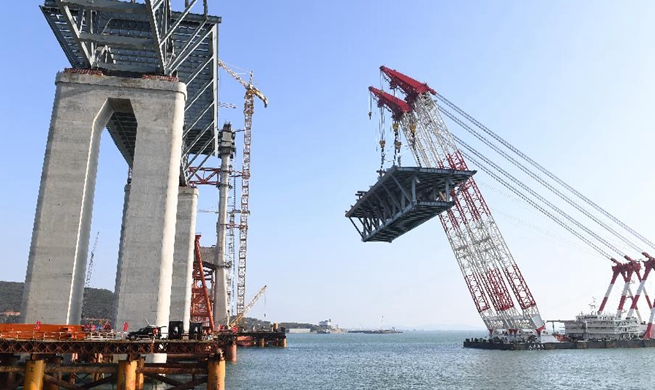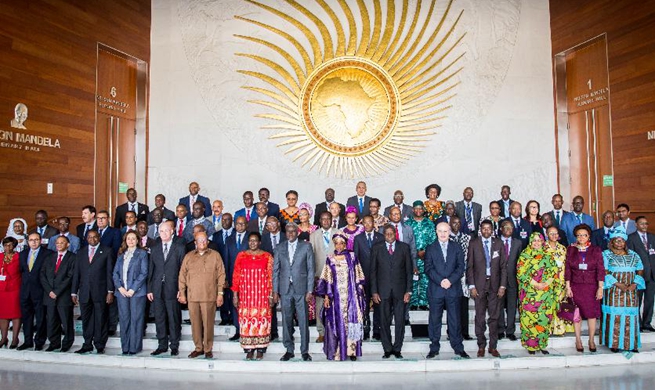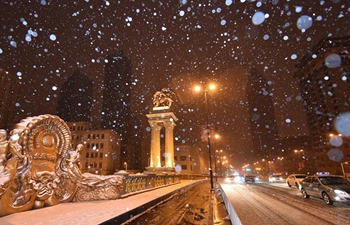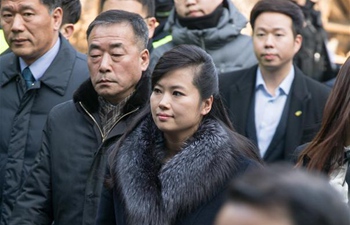by Moritz Rommerskirchen, Ren Ke
BERLIN, Jan. 22 (Xinhua) -- A narrow vote by the German Social Democrats (SPD) on Monday in favor of finalizing coalition negotiations with the Christian Democratic Union (CDU) and Christian Social Union (CSU) has drawn attention to the remaining challenges faced by a prospective new federal government.
Following a national tour of key SPD constituencies to make the case for a re-run of the current "grand coalition," party leader Martin Schulz was still only supported by 362 out of 642 (56 percent) delegates at the specially-convened conference in Bonn on Sunday.
The close result has since prompted heated debate within the SPD over its future political trajectory, as well as renewed calls for the CDU and CSU to offer further concessions in exchange for its political support.
A RESPITE TO COALITION TALKS
The SPD's greenlight to formal coalition talks with Angela Merkel gives a respite to German politics and avoided an imminent crisis.
Speaking to Xinhua, Daniela Schwarzer, director of the think-tank German Society for Foreign Policy (DGAP), said that Angela Merkel's fourth cabinet could play a crucial role in overcoming key challenges faced by Europe.
"With a strong, pro-European political leadership in place in France through President Emmanuel Macron, the new German government has both an opportunity and a responsibility to shape Europe together with all other member states," Schwarzer said.
Welcoming the SPD's decision on Sunday, German Chancellor and CDU leader Angela Merkel said that while the existing agreement between the three parties defined the "framework" for future legislative cooperation, its precise content would undeniably still be subject to "intense consultations." Merkel emphasized that her focus lay on establishing an economically-stable government.
During his speech at the SPD conference, Schulz vowed that a new government with the SPD's participation would show more initiative in promoting European integration. The former president of the European Parliament underlined the necessity to create an independent European Monetary Fund on the basis of the existing European Financial Stability Mechanism (ESFM) which "practices solidarity and does not preach austerity."
Schulz further promised to work towards "historic political change" and a "new dawn for Europe" if his delegates supported the party leaderships desire to join a new "grand coalition".
Just as Schulz was addressing SPD delegates, Merkel had travelled to Paris to discuss European reform plans with French President Emmanuel Macron. Both heads of state were keen to emphasize their desire to work together for the improvement of the European Union (EU) in a televised performance.
Schwarzer emphasized the pertinence of eurozone reform in particular, where Berlin should assist Macron's plans to "strengthen both the crisis management capacity of the euro area, but also to create better conditions for financial stability, investment and hence growth."
On a broad basis, there is absolutely no difference that I see (between German and French designs for European reforms)," Merkel said referring to a shared ambition to create an EU with strong finances, defenses and foreign policy.
DISAGREEMENTS REMAIN
But it seems still too early to talk about the ambitions of the new federal government, considering the disagreements among the parties.
The SPD Secretary General Lars Klingbeil expressed confidence on Monday that more of his party's demands would be accommodated in a new government than were included in the preliminary coalition agreement recently agreed.
"I believe that the CDU/CSU have understood that the SPD must be convinced (to join another grand coalition)," Klingbeil told public broadcaster ARD.
He pointed to regulations governing refugees' right to family reunification as one policy area where the CDU and CSU would need to give further ground. Although only 65 percent of SPD delegates lent their approval to final coalition talks, Klingbeil described the outcome of the Bonn conference as a "clear signal."
However, other CSU and CDU politicians were more outspoken in rebuffing SPD calls for renegotiations. Speaking in Munich, CSU leader Horst Seehofer said that all coalition partners would have to demonstrate restraint if they did not want to "endanger" the process of government formation.
Similarly, CDU vice president Julia Kloeckner said proposals which had been rejected in the first round of negotiations should not be tabled again. "We are certainly not the ones who are trying to undo the existing agreement," Finance Minister Peter Altmaier (CDU) said.
Volker Bouffier (CDU), governor of the state of Hesse, told the press that while the result of the SPD conference showed how internally-divided Schulz' party was, it could not be "the job of the CDU to unite it." As a consequence, the CDU and CSU would not re-open discussions on key points listed in the existing agreement.
Acknowledging that some disagreements still needed to be resolved, CDU parliamentary leader Volker Kauder said that he was nonetheless hopeful that coalition negotiations could be completed by the first week of March.
SWELLING DISSENT WITHIN SPD
Whether this optimistic prediction proves realistic will depend in large part on the ability of the SPD leadership to control swelling dissent within its own ranks. The SPD Youth Organization (Juso) in particular remains vehemently opposed to forming another "grand coalition".
Juso leader Kevin Kuehnert argued on Monday that the similarities between the SPD and the CDU/CSU had been "exhausted" and warned that German social democracy was hence in the midst of an "enormous crisis of trust." Kuehnert and other SPD members are concerned that another five years as junior partner in a Merkel cabinet will diminish the party's electoral prospects.
Frederick Cordes, regional Juso leader in North-Rhine Westphalia, went as far as to threaten to recruit to the SPD more critics of a "grand coalition." More than 400,000 SPD members will ultimately decide whether the party forms another government with the CDU and CSU in a final vote.
German media also speculated about the political fate of Schulz on Monday. Newspaper Sueddeutsche Zeitung wrote that the slim majority in Bonn was an evidence of low levels of support enjoyed by the SPD party leader among his own delegates.
Nevertheless, observers here still see some reasons to be more sanguine about the European implications of a progression to final-stage negotiations thanks to the SPD approval.




